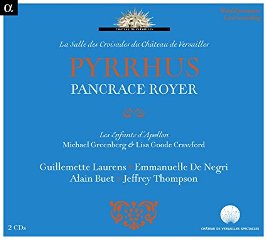Pancrace Royer – Pyrrhus (2014)
Pancrace Royer – Pyrrhus (2014)

Disc 1 1 Ouvertüre Prologue 2 Vous qui suivez 3 Mais, Minerve paraît 4 Redoutable dieu des combats 5 Cessez de disputer 6 Rondeau pour les Jesux et les Plaisirs 7 Doux, plaisirs 8 Gavotte 9 Menuet 1 - Menuet 2 10 France, quel est pour toi Act I 11 Jouissez de votre victoire 12 Triomphez liberté charmante 13 Oremier air pour les Troyens et les Proyennes 14 Suivez l'Amour 15 Rondeau 16 Passepied 1 - Passepied 2 17 Et quoi, vous me fuyez 18 Quel prix d'une si tendre ardeur! Act II 19 Je ne sais où je vais 20 Prince, reprenez l'espérance 21 Faut - il encor que je balance! 22 Marche: Célébrez un héros 23 Chaconne 24 Quels mouvements soudains! Disc 2 Act III 1 Ritournelle 2 Que vois - je! 3 Prêt à souffrir la violence 4 Après ce que j'ai fait 5 Courons à ses genoux 6 Enfin, voici ce jour 7 Daigne un moment 8 Dépit jaloux 9 Cours redoubler 10 Jouissons des plaisirs 11 Deuxième Air 12 Evoquons 13 Pour toi, que faut - il entreptrednre? Act IV 14 Portons partout l'horreur 15 Je vours trouve einfin 16 Ne tentez plus 17 Qu'il se flatte 18 Barbare 19 Polyxène à l'amour 20 Ta voix s'est fait entendre 21 Charmante liberté 22 Deuxième Air 23 Suspendez Act V 24 Transports d'amour 25 Mais, quel spectacle à mes yeux se prèsente? 26 Chantons 27 Ne craignez rien Prologue: Mars – Virgile Ancely (bass) Jupiter – Christophe Gautier (bass) Minerve – Edwige Parat (soprano) Opera: Pyrrhus – Alain Buet (bass-baritone) Acamas – Jeffrey Thompson (countertenor) Polyxène – Emmanuelle de Negri (soprano) Ismène & Thétis – Nicole Dubrovitch (soprano) Eriphile – Guilemette Laurens (mezzo-soprano) L'ombre d'Achille – Laurent Collobert (bass) Les trois Euménides – Virgile Ancely (bass), Brian Cummings (tenor), Jean-Yves Ravoux (tenor) Une nymphe de Thétis – Sophie Decaudaveine (sopranо) Le Grand Prêtre – Paul Willenbrock (bass) Un des soldats – Olivier Fichet (tenor) Une troyenne – Solange Añorga (soprano) Un troyen – Bruno Renhold (tenor) Les Enfants d’Apollon (Ensemble) Michael Greenberg - conductor
In September, 2012, modern première of Pancrace Royer's Pyrrhus at the Château de Versailles. Royer was a contemporary of Jean-Philippe Rameau who wrote marvelous harpsichord music and also composed operas. This 1730 tragédie en musique is the second Royer opera to be revived by project director Lisa Goode Crawford, who produced his 1743 opera-ballet Le Pouvoir de l'Amour at the Oberlin Conservatory of Music in 2002, to critical acclaim, both for the production and for the music, heard for the first time since the eighteenth century. Emerita professor of harpsichord at Oberlin, Ms. Crawford will be collaborating with Michael Greenberg and his group Les Enfants d'Apollon, based in Paris, to perform the opera in concert version in the Salle des Croisades of the château. She is also completing a critical edition of Pyrrhus for the Centre de Musique Baroque de Versailles; so this concert, a significant event in itself, will also help to inform the edition.
Pyrrhus was the first of several works Royer composed for the Paris Opera and his only tragédie en musique. Withdrawn after seven performances, it has never been revived. This concert will be its modern premiere - not an unusual occurrence in the world of historically informed performance, but Pyrrhus is distinctive because it is one of the few operas created at the Paris Opera for which the original performance material has survived intact. Theoretically, if the manuscripts were to be placed before the same number of musicians as participated in the creation, it would be possible to give the eighth show... nearly three hundred years later! A most remarkable means of time travel.
These original instrumental and vocal parts are invaluable for enabling the reconstitution of the original score of Pyrrhus, for which no autograph manuscript is known to survive. Because we have a complete set of parts, we do not have to rely on the 18th century printed reduced score, which, as was usual with such scores, does not include the inner string parts or chorus parts, and which is often vague about the orchestration of the melody instruments. Saving space by reducing the score reduced the cost of publication of such scores in the 18th century. However, it also resulted in omissions and ambiguities that allow today's musicians a great deal of latitude in instrumentation compared with the music of the Classical and Romantic periods. As a consequence, the personal taste of today's performers often decides the choice of instrumentation. For example, it is possible to perform the operas of George Frideric Handel (1685-1759) with a forty-piece orchestra or an ensemble comprising only two violins, a violoncello and a harpsichord. Without access to original performance material, such a subjective approach is often applied generally to works of music created over an extended historical period, without consideration for their geographical origin or the specific style of the composer.
On the other hand, the source material of Pyrrhus, by allowing the complete restoration of the work, reveals with rare detail how its young composer, fully aware of the resources available to him at the Paris Opera, calculates his instrumental effects. In this regard it contributes significantly to our knowledge of French opera and the evolution of the symphony orchestra.
The drama is remarkably coherent for an opera libretto. Pyrrhus conquers Troy and kills its king but is himself subjugated by the beauty of the defeated princess Polyxène. She in turn is coveted by Pyrrhus's companion in arms, Acamas, and despised by the magician-princess Eriphile, Pyrrhus's betrothed, who join forces to prevent the union. Torn between her duty towards her defeated people and her own happiness, will Polyxène declare her love for Pyrrhus before the sinister projects of Eriphile and Acamas succeed? The suspense is maintained until the final bar! --- Lisa Crawford, kickstarter.com
download (mp3 @320 kbs):








